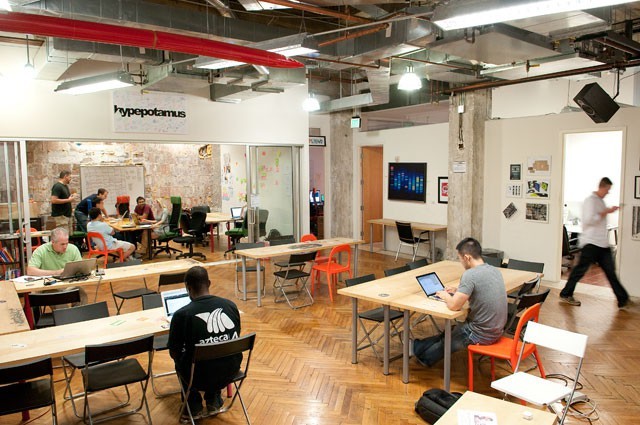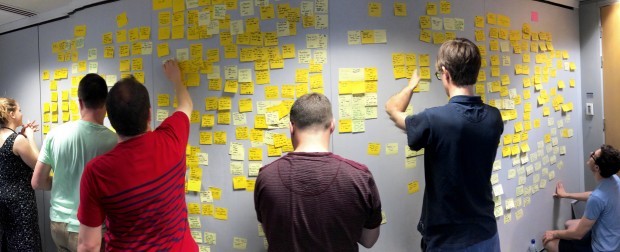Project Management: Life Cycle and Research Phase

Note translator: this is a translation of one of the parts of a large manual from the GovUK team that designs services for the British Government The manual describes in detail about each stage of the service life, and this translation describes the first stage - the study .
There are 5 stages of the development of services - the stage of research, alpha testing, testing in real conditions (beta testing), the immediate launch and operation of the product / application and decommissioning. Project management plays a huge role throughout all phases, ensuring a smooth, seamless transition from one step to another.
')
1. The research phase
During the first stage of the study, your team will need to find new information at the maximum speed, and you will need to support your players: to make decisions about the future direction of the product, to help in overcoming difficulties.
At this point, you:
- create conditions for the successful provision of software services;
- decide whether to go to alpha testing;
- analyze and change the work and management of your team before alpha testing, based on what you were able to figure out at the first stage.
You may need to obtain from the supervisor the funding necessary to start working on this project.
2. The first stage of testing (alpha testing)
The essence of this stage is testing prototypes with the involvement of potential users. The main goal is to get an approximate picture of how the final product will look.
At this stage, you:
- decide whether to go to beta testing;
- analyze and possibly change the work and management of your team before beta testing, based on what you were able to figure out at this stage.
To get closer to the beta test stage, you need to:
- build the final business model of the project and get its approval;
- if necessary, obtain control approval of the project from the higher management;
- prepare and go through the service evaluation procedure for compliance with specified standards.
You must be sure that you are doing all this on time, and you have enough time for the delivery team to start beta testing, otherwise you will slow down the process.
3. Testing in real conditions (beta testing)
The main goal at the beta testing stage is to develop the service and test it with the involvement of users. You may need to scale the service to achieve your ultimate goals.
You must adjust the service management model to ensure that it currently corresponds to the scope of the project and the stage at which you are located. You also need to update your business plan.
If you do not fit into the agreed allowable cost limit, you will need to reassess the necessary investments. To proceed to the next stage.
4. Start and work of the project
You will need to make sure that you have the appropriate resources to improve the project. This will make the service as sensitive as possible to changes in user needs and develop a specific concept for the development of the project.
If the service is undergoing major changes, it is necessary to revise the business plan once again.
5. Decommissioning
Existing service can be removed or replaced. In case you close the project, you should (if possible) leave the users with an alternative that would replace the remote service.

Project management at the research stage
This stage can be much more productive if you start with:
- descriptions of the original type of service;
- service manager appointments;
- formation of a group of researchers;
- coordination of the results to which you want to come at this stage.
At this stage, proper project management is very important. You will need to think through the questions:
- the process of supplying the service and ensuring its quality;
- financing and permits;
- formation of the service delivery team.
The management will be transferred to a small team of specialists who will act as project mentors. They will be in close contact with the delivery team, studying the needs of the service during the research.
Research planning
Before you begin your research, you need to get confirmation that what you are doing fits into your organizational strategy.
You need:
- develop the concept of service: its main purpose, for whom it is intended, and justify its necessity;
- agree on a list of goals set for implementation at this stage and think up a way to measure progress;
- identify stakeholders;
- establish the initial stage of management and find out what people expect.
Perhaps the list of goals will initially be incomplete, there will be little evidence to substantiate them. Your initial idea of the service / concept will probably also change.
Tell and show
The practice of demonstrating work on a product and active communication is extremely important and useful in the management process at this stage, because:
- the team will be able to demonstrate progress in meeting the objectives of the study;
- you can see how well people work together;
- You can support them and help them cope with certain difficulties that hinder their work.
Financing
Consider spending on:
- working staff;
- BY;
- infrastructure;
- providing a working environment and jobs for the team.
You may have to invest additionally at different stages. You will also need:
- design and development tools;
- laboratory for user research (optional);
- a bunch of magnetic marker boards, stickers and pens.
Get the approval of your department to finance your project, as well as coordinate expenses at the stage of research and alpha testing with your supervisor.
Expand the concept of the project
The concept of service should clearly define:
- what the service is and for whom it is intended;
- its main advantages;
- how your progress will be assessed;
- the way it fits into the future organizational strategy.
It may also contain known risks and limitations.
Decide whether to continue research or not.
At the research stage there are 3 possible outcomes. You can:
- spend extra time on research (if not enough information is found);
- start anew (if you need to learn something completely different from what it was first);
- go to alpha testing.
Use the conclusions of the first stage of work. At any time during the study, you can decide to suspend the project.
 Announcement:
Announcement:On October 8, 2015 at 18:30, the FIA Open Doors Day will take place. If you develop your own project, come and chat with our experts. Participation is free, registration is required.
Apply to the 8th Accelerator Set of the IIDF until October 22.
Source: https://habr.com/ru/post/295110/
All Articles